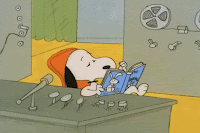Welcome back everyone. Or welcome for the first time if you’re part of this ridiculous wave of new people following me around. Either way, glad to have you here.
I wanted to get back to the A2Q and wade out into the less-enjoyable parts of this whole writing thing. I know some of you thought the first draft was the less-enjoyable part, and for others of you it may have been the editing. But I’m willing to bet most of you are going to moan and grumble and gnash your teeth at this part.
It’s time to talk about feedback and criticism.
Now, if I don’t plan on showing this to anyone—if I just wanted to write a book to prove to myself I could write a good, complete novel—congratulations. You’re done. I hope all of this was helpful in some way. Feel free to follow along more if you want, but we’re definitely going to be leaning in a certain direction from here on.
The rest of you…
If my goal is publication—traditional or self—I’m going to need to deal with feedback. Or to put it another way, criticism. This is an essential part of the process. No, it really is. These days with people shouting at movie studios and directors and authors for every choice they make, it’s good to remember that actual criticism refers to an objective critique of my work from someone qualified to make it.
So let’s talk about criticism. Why we need it. Who we need it from. And accepting it. Well, some of it. Depending.
First off, why do we need it? Well, so we can improve. You’ve probably heard about people talking about “going blind to things,” and I’m a big believer in that. Sometimes we get so focused and invested on something that we don’t see problems—or solutions—that are sitting right in front of us. I’ve talked a couple times in the A2Q about “fresh eyes” on the manuscript, and the freshest are going to be the ones that’ve never seen it before.
The simple truth is, none of us are the end-all, be-all of writing. There will always be things we miss. Things we do wrong. Things we can improve. Anyone who thinks otherwise is just… wrong. No other way to put it.
 I’ve been doing this for a while now, but my editor actually came up with the last line of Dead Moon after I went through at least seven or eight different versions of it. I’ve helped at least three writer-friends work through problems recently. And I’m kinda gearing up to show this new book to a few of my regular people. Cause it may be my book, and I absolutely get to write it the way I want, but I still need to be aware of how it’s going to appear to other eyes. Some folks might not get that joke. Others may not like that character. And it’s entirely possible I’m just doing something wrong and don’t realize it. Maybe not even wrong, but it’s possible I could do it much better.
I’ve been doing this for a while now, but my editor actually came up with the last line of Dead Moon after I went through at least seven or eight different versions of it. I’ve helped at least three writer-friends work through problems recently. And I’m kinda gearing up to show this new book to a few of my regular people. Cause it may be my book, and I absolutely get to write it the way I want, but I still need to be aware of how it’s going to appear to other eyes. Some folks might not get that joke. Others may not like that character. And it’s entirely possible I’m just doing something wrong and don’t realize it. Maybe not even wrong, but it’s possible I could do it much better.
Next would be, who do we need it from. Oddly enough, not from assorted unknown randos on the internet who want to tell us everything we’re doing wrong. If I’m going to get feedback from someone, it needs to be someone I trust, and someone I trust to be objective. And there’s a good chance that person isn’t RealWriter173643—“I’m bringing the novel BACK after twenty years of garbage from big publishers.”
(Don’t listen to that guy)
A fairly common thing is to get some beta readers. Nothing wrong with that, but I think they need to be chosen carefully. I’ve seen folks who’ll just desperately send their material to anybody willing to read it. And while I completely understand that need to be read, I think finding a beta reader this way is likely to do more harm than good.
A good beta reader, like I said, is someone I can trust to be honest with me. Brutally honest, if need be. Let’s face it—a lot of our friends and family and significant others have a vested interest in keeping us happy. They’re probably going to be overly gentle with the criticism, maybe even tell a few white lies. So we should be a little cautious before immediately handing it off to one of them.
They also need to be someone with a relevant background. Just because someone was a solid B+ English student back in high school and has read a lot of books doesn’t mean they’re going to understand the nuances of narrative structure and how it works. There’s a lot more to it than that.
And finally, my beta reader should actually want to help me. If you’ve ever been in a writing group, either real world or online, you know there are those folks who just live to rip stuff apart. They delight in showing you how you may have messed up, but rarely offer any actual help. They just think they’re scoring points for being more vicious and nitpicky than anyone else. Might be worth noting that—at least in my experience—these folks often think their opinions about a manuscript should be treated as hard facts. These aren’t the kind of people you need critiquing your book. I mean, you don’t need people like that in your life at all.
Personally… I think beta readers are a good thing. Even if it’s just one person I let read this before I send it off into the world. Especially if this is all new to me and my first time trying to put a novel together. I don’t want to have a weird turn of phrase or an obscure reference or maybe a line that can really be misread which suddenly makes me or the book look very wrong.
 Look at it this way. This is a way to get feedback under controlled conditions. I’m picking the person who’s going to see this first. I’m making sure it’s someone I can trust, and also—not meant in a harsh way—someone who won’t matter. This isn’t making a first impression on an editor or an agent or a potential reader-who-likes-my-stuff-enough-to-pay-for-it. It’s somebody I know who already knows me
Look at it this way. This is a way to get feedback under controlled conditions. I’m picking the person who’s going to see this first. I’m making sure it’s someone I can trust, and also—not meant in a harsh way—someone who won’t matter. This isn’t making a first impression on an editor or an agent or a potential reader-who-likes-my-stuff-enough-to-pay-for-it. It’s somebody I know who already knows me
Actually, one last thought here. I probably don’t want too many beta readers. I think if I’m hitting double digits this manuscript’s going out to too many people. This is when it suddenly turns into that writing group or class where I’ve got a fifteen or twenty copies of my manuscript to go over, and maybe some of them also have additional documents. If I wrote a 400 page book, that’s almost eight thousand pages of notes and comments to go through. And the truth is, they’re going to get redundant fast. Get people you trust, get enough of them to be a good sample size.
At this point in my life, I’ve got four people I consider good, solid beta-readers. Two are men, two are women. Two are screenwriters. Two are novelists. Two are professional editors (there’s some overlap here, clearly). One writes comic books. All of them have different backgrounds and different fandoms and hobbies. I’ve known all of them for at least ten years, and I know them all (and they know me) well enough to be as brutally honest as they need to be.
And I know some folks think of this as “meddling” or a waste of time, but it’s not. Which brings us nicely to… accepting criticism.
This final part is where I think a lot of people crumble, one way or another. Some folks accept any and all criticism as evidence of their failures and toss their manuscript in the incinerator. Other people simply refuse to bend, not yielding an inch or admitting the possibility of a single flaw in the glory of their creative vision made manifest.
If I have good people reading my manuscript, there’s no reason to reject what they have to tell me. They’re trying to help me, right? We just said that. Why am I fighting it now?
Well, we all know why. It hurts. It’s scary to think we put all this effort into something, invested all this time, and it just wasn’t enough. It still needs more work. it’s enough to make you give up. Or maybe dig in your heels and shout “no, no, no, NO!”
 But look, we’ve already done this twice, right? No matter how rough it was, we made a bunch of decisions and observations when we put our outline together. And then we did it again after our first draft was done, when we were looking at the overall plot/story with fresh eyes and seeing where it needed some tweaks. This is just one more pass from someone who doesn’t have any preconceptions about what’s on the page. They’re not going to see what I think is there… they’re just going to read what’s there. And it’s important I know that.
But look, we’ve already done this twice, right? No matter how rough it was, we made a bunch of decisions and observations when we put our outline together. And then we did it again after our first draft was done, when we were looking at the overall plot/story with fresh eyes and seeing where it needed some tweaks. This is just one more pass from someone who doesn’t have any preconceptions about what’s on the page. They’re not going to see what I think is there… they’re just going to read what’s there. And it’s important I know that.
I need to be open to this criticism. I asked for it, after all. I wanted these people to help me find the weak spots and confusing moments and that one word I keep using that does not mean what I think it means.
Go over the notes your readers sent back. Really read their comments, don’t just skim looking for praise. Or for scorn.
And then… take a deep breath or two. Step away from the computer. Maybe have a drink. And a nice meal. And another drink. Just don’t sit there glaring at it.
Because I guarantee you, some of these notes are going to burn. They will leave welts. People aren’t going to get all your jokes. They’re going to be baffled by some of your word choices. Someone’s going to say that wonderfully cute and endearing character you spent so much time on is just annoying as hell. You will feel yourself ready to snap back like you were reading the comments section on a political article.
Let all those first responses go away. Resist the animal urge to strike back at those who’ve hurt you and yours. Accept that this is going to help you.
Okay, maybe have another drink. But I’m cutting you off after that one. You’re not going to be some flat Hemingway cliché.
And hey, speaking of having drinks…
As some of you may have noticed, WonderCon didn’t happen this year. One of the many, many cons that have fallen before our current pandemic crisis. I was going to host the annual Writer’s Coffeehouse there. I don’t talk about the publishing side of things much here, but that’s all we talk about at the WonderCon Coffeehouse
 But now WonderCon is doing a bunch of virtual panels, and Friday afternoon (tomorrow) I’m going to be recording a Coffeehouse with Kristi Charish, Stephen Blackmoore, and ML Brennan. But we need questions from you. So hit us up with your questions about publishing—any questions—and the four of us will try our best to give useful answers. Put questions in the comments down below, send them to one of us on Twitter, or if you feel a little self-conscious about standing up in front of everyone, you can send me a DM on Twitter or an email at peterclines101@yahoo.com and then when we talk you can just be “V” or “Crash Override” or “somebody else.”
But now WonderCon is doing a bunch of virtual panels, and Friday afternoon (tomorrow) I’m going to be recording a Coffeehouse with Kristi Charish, Stephen Blackmoore, and ML Brennan. But we need questions from you. So hit us up with your questions about publishing—any questions—and the four of us will try our best to give useful answers. Put questions in the comments down below, send them to one of us on Twitter, or if you feel a little self-conscious about standing up in front of everyone, you can send me a DM on Twitter or an email at peterclines101@yahoo.com and then when we talk you can just be “V” or “Crash Override” or “somebody else.”
Next time… let’s talk about working through other people’s notes.
Until then, go write.
 The Micro and Macro– This is one of the ones were it’s especially important to have a really good sense of my readers. When it comes to criticism, any book is going to have two aspects to it. There’s the big picture stuff—did you like it? Did the twist make sense? Was Wakko’s overall motivation believable? Then there’s the smaller stuff—does this line of dialogue work? Does this description stand out? Is this action too detailed?
The Micro and Macro– This is one of the ones were it’s especially important to have a really good sense of my readers. When it comes to criticism, any book is going to have two aspects to it. There’s the big picture stuff—did you like it? Did the twist make sense? Was Wakko’s overall motivation believable? Then there’s the smaller stuff—does this line of dialogue work? Does this description stand out? Is this action too detailed?
 I need to trust my beta readers. If I’ve got any doubts about their abilities, their motives, or their work ethic… I probably shouldn’t ask them to read this. If I’m going to ignore what they tell me, or tell myself they just didn’t get it… I probably shouldn’t ask them to read this. We need to be open to the criticism we’re going to get, and we have to trust the people giving it to us.
I need to trust my beta readers. If I’ve got any doubts about their abilities, their motives, or their work ethic… I probably shouldn’t ask them to read this. If I’m going to ignore what they tell me, or tell myself they just didn’t get it… I probably shouldn’t ask them to read this. We need to be open to the criticism we’re going to get, and we have to trust the people giving it to us.














